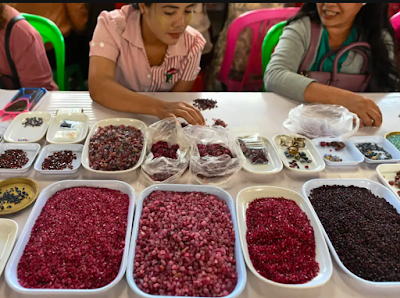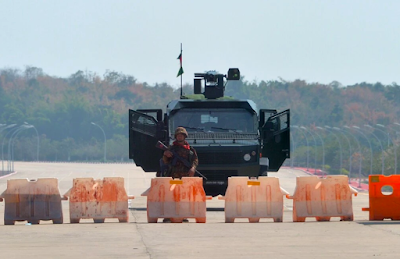Myanmar, caught between a coup and a flawed icon.
 |
| Photo by STR/AFP via Getty Images |
The coup in Myanmar has rightly been greeted with almost universal condemnation. The few exceptions Russia, China, Cambodia, Thailand, are governed by authoritarian leaderships and have little appetite for democracy and civil rights. Once again, Myanmar’s National League for Democracy’s leadership is under arrest, and students and civil rights activists fear military reprisals if they openly defy the Junta. Naturally, the latest iteration of military rule has once again thrust Daw Aung San Suu Kyi into the spotlight. Once again, she has become the personification of the struggle against military rule, a role she has spent almost half her life dedicated to. Under house arrest for fifteen years, she became an international icon for the struggle for democracy worldwide, winning the Sakharov Prize for Freedom of Thought in 1990 and the Nobel Peace Prize in 1991. Once more, the coup has thrust her into the global spotlight, and her image adorns everything from posters and tee-shirts to a wide array of social media memes circulated by protestors.
 |
| Rohingya refugees at Cox's bazar, Bangladesh. Photo courtesy of REUTERS/Rafiqur Rahman |
And yet… the coup should not be used as an excuse to white-wash Suu Kyi’s deeply flawed leadership as the country’s first de facto democratic leader since 1962. We must not forget that while Suu Kyi was the beneficiary of numerous prizes for her courageous stand against military rule, many of these were rescinded for her controversial role in the genocide of Myanmar’s Muslim Rohingya population that began in 2016. In March 2018, the United States Holocaust Memorial Museum revoked her Elie Wiesel Award, the Canadian government stripped her of her honorary citizenship, while Oxford, Dublin, and Edinburgh withdrew their honorary freedom awards. Finally, in 2020 the European parliament suspended her from the Sakharov Prize Community.
 |
| Aung San Suu Kyi at the ICJ hearing on the Rohingya genocide, December 2019. Photo: Koen van Weel/ANP/AFP via Getty Images |
In a defiant speech before the International Court of Justice in the Hague, she defiantly stated that allegations of genocide were “incomplete and misleading”, instead arguing that the situation was a Burmese military response to attacks in Arakan state by armed Rohingya separatists. By the time the coup unfolded, more than a million Rohingya had fled to neighboring countries, an estimated 24,000 had been killed, over 8,000 women and girls raped, and over 100,000 Rohingya violently assaulted.
The present struggle against the coup in Myanmar is not Aung San Suu Kyi’s alone. We must not forget her role in the genocide of the Rohingya even while we condemn the generals that have arrested her and defied the results of the elections of November 2020. The struggle for democracy in Myanmar is not one woman’s struggle but the struggle of the millions of Myanmar voters who overwhelmingly rejected political parties linked to the military. The fight for democracy in Myanmar is a struggle that unites the country’s diverse ethnic groups, whether Burmese, Shan, Karen, Mon, Kachin, Chin, Kayah, or Rohingya. It is a struggle by Buddhists, Hindus, Christians, Sikhs, and Muslims. It is a struggle by the veterans of the 88 generation (including Suu Kyi) and all those who were born, raised, and reached their political maturity under the authoritarian regime that ruled Myanmar between 1990 and 2015. Indeed more than half the country’s population were born after the stolen election of 1990.
 |
| Myanmar is one of the world's leading suppliers of rubies. |
The international community must condemn the coup. Furthermore, targeted sanctions should be re-applied on the regime, on individuals responsible for the coup, on critical sectors of the economy that the Junta disproportionately benefits from (such as precious metals), and on businesses owned by the Myanmar Economic Corporation and Myanmar Economic Holdings Limited (corporations run by the Burmese military). Maximum diplomatic, economic, and financial pressure should be leveraged against Myanmar until democracy is restored. However, we must not allow Suu Kyi’s role in the genocide of the Rohingya to be forgotten. She and others who enabled this tragedy to occur must continue to be held responsible. The two positions are not and should not be incompatible.


Comments
Post a Comment